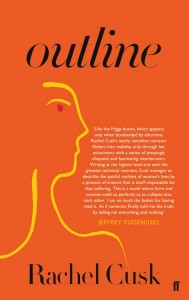 Published by Faber & Faber UK, Farrar, Straus & Giroux US
Published by Faber & Faber UK, Farrar, Straus & Giroux US
256pp, hardcover, £16.99
Reviewed by Caroline Sanderson
Every reader should have a few troubling writers in their life. Writers who niggle at you and mess with the truisms you’ve grown fond of. Ever since I read A Life’s Work, her bravely navel-gazing non-fiction book about motherhood, Rachel Cusk has been one of those writers for me. Even more so now I’ve read her bracing and brilliant and odd novel Outline, shortlisted for the 2015 Baileys Women’s Prize for Fiction.
The narrator of the novel is a woman (only late on do we discover her name) who flies to Athens to teach on a one week writing course. I say ‘narrator’, but actually she is an indistinct figure; like the artist whose self-portrait appears in the mirror in the background of a painting. And ‘all’ that really happens in Outline is a series of conversations between the ‘narrator’ and various interlocutors who cross her path during the week. They include the billionaire she lunches with in London just before leaving; the thrice-divorced man she sits next to on the plane, thereafter referred to as ‘my neighbour’; Ryan, her fellow tutor; a Greek feminist novelist of some renown; and the students in her creative writing class.
The ‘narrator’ in fact says very little, while the observations and confessions of those she encounters dominate, along with their thoughts on life and relationships, and also on writing (‘Writers need to hide in bourgeois life like ticks need to hide in an animal’s fur: the deeper they’re buried, the better.’)
It threw me at first, this technique. When will we properly meet the ‘narrator’, I kept wondering. When will the camera switch its focus? But it never really does. It is Cusk’s skill as a novelist that nevertheless allows us to gain an intimate knowledge of her narrator, a woman whose encounters with the world render her indistinct, ambivalent and often invisible. Her responses to those she meets, though sparsely recorded are devastating in their sense of abdication of will. ‘I was beginning to see my own fears and desires manifested outside myself, was beginning to see in other people’s lives a commentary on my own.’ ‘I thought the whole idea of a “real” self might be illusory: you might feel…as though there were some separate, autonomous self within you, but perhaps that self didn’t exist.’ ‘I had come to believe more and more in the virtues of passivity, and of living a life as unmarked by self-will as possible.’ Nevertheless, she says, she is, ‘trying to find a different way of living in the world.’
I found myself drawings comparisons between Outline and Sheila Heti’s How Should a Person Be?, another ‘philosophical’ novel about ‘how to live’ which I reviewed for this site two years ago. Reading it was a chaotic, exasperating experience. Despite glints of insight, it felt brittle and self-indulgent and showy. Outline, on the other hand, is the real deal. It is a stealth bomber of a novel. You can barely see it, but its aim is devastating.
